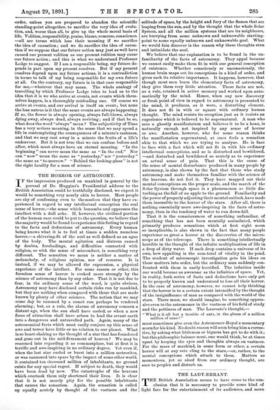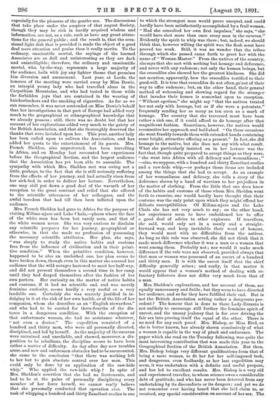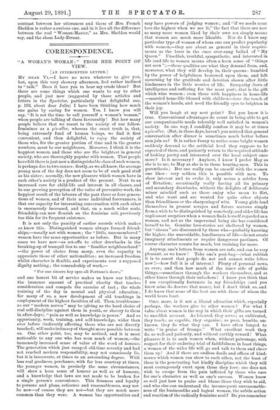THE LADY-ERRANT.
THE British Association seems to have come to the con- clusion that it is necessary to provide some kind of light fare for the entertainment of its audiences, and more
especially for the pleasure of the gentler sex. The discussions that take place under the auspices of that august Society, though they may be rich in hardly acquired wisdom and information, are not, as a rule, such as have any great attrac- tions for the general public ; and the result is, that the occa sional light dish that is provided is made the object of a good deal more attention and praise than it really merits. To the ordinary, unscientific mortal, the sayings of the learned Associates are as dull and uninteresting as they are dark and unintelligible ; therefore, the ordinary and unscientific mortal, who, by-the-way, represents a large majority of the audience, hails with joy any lighter theme that promises him diversion and amusement. Last year, at Leeds, the honours of the meeting were carried away by Miss Dowie, an intrepid young lady who had travelled alone in the Carpathian Mountains, and who had tasted in those wilds the forbidden joys that are contained in the wearing of knickerbockers and the smoking of cigarettes. As far as we can remember, it was never contended on Miss Dowie's behalf that her investigations in that part of Europe had added very much to the geographical or ethnographical knowledge that we already possess ; still, there was no doubt but that her account of her explorations added very much to the gaiety of the British Association, and that she thoroughly deserved the thanks that were lavished upon her. This year, another lady has been called upon to enliven the Association, and has added her quota to the entertainment of its guests. Mrs. French Sheldon, also unprotected, has been travelling in Africa, and on Monday last recounted her experiences before the Geographical Section, and the largest audience that the Association has yet been able to assemble. The sympathy with which Mrs. Sheldon met was owing not a little, perhaps, to the fact that she is still seriously suffering from the effects of her journey, and had actually risen from her sick-bed in order to deliver her lecture. Nevertheless, one may still pat down a good deal of the warmth of her reception to the great contrast and relief that she offered to the scientific utterances of her colleagues, and the awful boredom that had till then been inflicted upon the audience.
Mrs. French Sheldon had gone to Africa for the purpose of visiting Kilima-njaro and Lake Chala,—places where the face of the white man has been but rarely seen, and that of the white woman never. She was very anxious to disclaim any scientific purposes for her journey, geographical or otherwise, in that she made no profession of possessing the necessary scientific attributes. Her plan, she says, "was simply to study the native habits and customs free from the influence of civilisation and in their primi- tive condition." When the primitive condition, however, happened to be also an unclothed one, her plan seems to have broken down, though even in this matter she assured her audience that the wild savages hastened to meet ber half-way, and did not present themselves a second time in her camp until they had draped themselves after the fashion of her own porters. Her curiosity on the matter of native habits and customs, if it had no scientific end, and was merely feminine curiosity, seems hardly a very useful or a very laudable one. Certainly she was scarcely justified in in- dulging in it at the risk of her own health, or of the life of her companion, whom she describes as an "English stewardess," and who had to be carried for three-fourths of the dis-
tance in a dangerous condition. With the exception of that unfortunate woman, she had no assistance whatever, " not even a doctor." The expedition consisted of a hundred and thirty men, who were all personally directed, disciplined, and led by herself. As the majority of the caravan were untrained and unreliable, and showed, moreover, a dis-
position to be rebellious, the discipline seems to have been rather a matter of difficulty. As day after day new troubles arose, and new and unforeseen obstacles had to be surmounted, she came to the conclusion " that there was nothing left to her but to gain absolute control over her men. This could only be done by an application of the raw-hide whip." Who applied the raw-hide whip ? In spite of Mrs. Sheldon's assertion that she had no lieutenants, and had to be at the pains of personally disciplining every member of her force herself, we cannot really believe that she personally conducted that operation also. The task of whipping a hundred and thirty Zanzibari coolies is one
to which the strongest main would prove unequal, and could hardly have been satisfactorily accomplished by a frail woman.. " Had she consulted her own first impulses," she says, " she would have shot more than once every man in the caravan." Evidently the spirit to whip was there; but, indeed, we should think that, however willing the spirit was the flesh must have proved too weak. Still, it was no wonder that the tribes through which she passed came forth to greet her with the name of " Woman-Master." From the natives of the country, she says that she met with nothing but homage and deference,. and never with any rudeness ; not only the human beings, but the crocodiles also showed her the greatest kindness. She did not mention, apparently, how the crocodiles testified to their good-will. It is true that crocodiles do not often go-out of their way to offer rudeness ; but, on the other hand, their general method of welcoming and showing regard for the stranger that invades their homes is somewhat open to exception. " Without egotism," she might say " that the natives treated her not only with homage, but as if she were a potentate," frequently sending her as many as ten oxen as a mark of homage. The country that she traversed must have been rather a rich one, if it could afford to do homage after that- magnificent fashion. Sometimes, however, the natives would reconnoitre her approach and hold aloof. " On these occasions- she went frankly towards them with extended hands containing some bright, attractive offering as a present." In fact, she did homage to the native, but she does not say with what result_ What she particularly insisted on in her lecture was the fact that, though quite prepared to accept things as they were, " she went into Africa with all delicacy and womanliness ; " —also, we suppose, with a hundred and thirty Zanzibari coolies- and a raw-hide whip,—or perhaps those items are included among the things that she had to accept. As an example of her womanliness and delicacy, she tells a story of the deference shown by a band of warriors to her prejudices in the matter of clothing. From the little that one does know of the habits and customs of those whom Mrs. Sheldon went forth to examine, one would hardly have thought that their costume was the only point upon which they migheoffend her delicate susceptibilities. Of Kilima-njaro and the Lake Chala she has not very much to say; on the other hand, her experiences seem to have emboldened her to offer a good deal of advice to other explorers. If travellers, she said, would only act in a manly and a straight- forward way, and keep inviolable their word of honour, they would meet with no difficulties from the natives_ As long as this rule was observed, she did not think that it made much difference whether it was a man or a woman that went among them. Probably not ; nor would it make much difference if the rule were not observed, provided always that that man or woman was possessed of an escort of a hundred and thirty men. It is with the escort itself that the chief difficulty generally arises ; and really, in that matter it would appear that a woman's method of dealing with re- fractory followers does not differ very much from that of a man.
Mrs. Sheldon's explorations, and her account of them, are equally unnecessary and futile; but they seem to have diverted her audience, and so far they have fulfilled their end. But is not the British Association setting rather a dangerous pre- cedent ? The honour that is done to these Lady-Errants is not unlikely to encourage still further the feminine spirit of unrest, and the uneasy jealousy that is for ever driving the fair sex into proving itself the equal of the other. There is- no need for any such proof. Mrs. Bishop, or Miss Bird, as she is better known, has already shown conclusively of what a woman is capable in the way of pluck and endurance. The paper which she read on the Tuesday following, was quite the most interesting contribution that was made this year to the Geographical Section of the British Association. But then, Mrs. Bishop brings very different qualifications from that of being a mere woman, to fit her for her self-imposed task, and dangerous, even foolhardy, as her last expedition may seem, it was undertaken with a definite and useful purpose, and has led to excellent results. Mrs. Bishop is a very old and experienced traveller, to whom science owes a considerable debt of gratitude, and who has never been deterred from any undertaking by its discomforts or its dangers ; and yet we do not remember ever having heard that she laid claim to, or received, any special consideration on account of her sex. The
contrast between her utterances and those of Mrs. French Sheldon is rather a curious one, and in it lies all the difference between the real " Woman-Master," as Mrs. Sheldon would say, and the sham Lady-Errant.




































 Previous page
Previous page